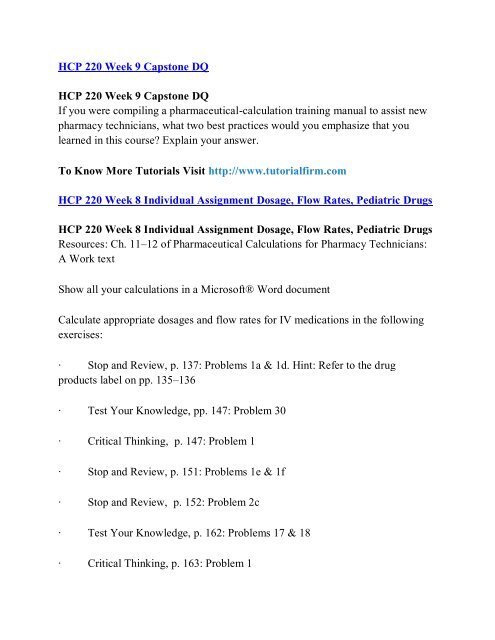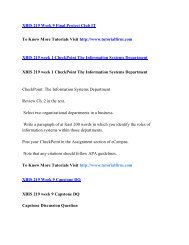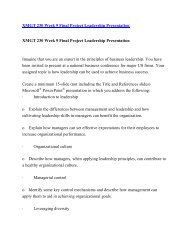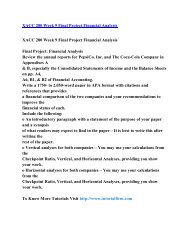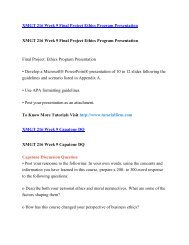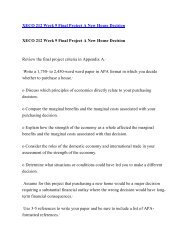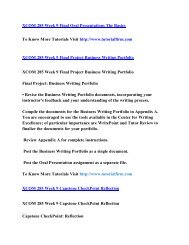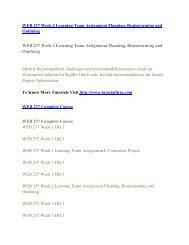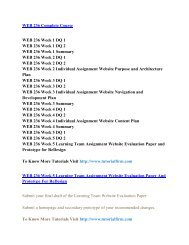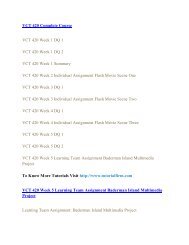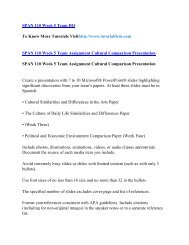HCP 220 UOP Tutorials,HCP 220 UOP Assignments,HCP 220 UOP Entire Class
Create successful ePaper yourself
Turn your PDF publications into a flip-book with our unique Google optimized e-Paper software.
<strong>HCP</strong> <strong>220</strong> Week 9 Capstone DQ<br />
<strong>HCP</strong> <strong>220</strong> Week 9 Capstone DQ<br />
If you were compiling a pharmaceutical-calculation training manual to assist new<br />
pharmacy technicians, what two best practices would you emphasize that you<br />
learned in this course? Explain your answer.<br />
To Know More <strong>Tutorials</strong> Visit http://www.tutorialfirm.com<br />
<strong>HCP</strong> <strong>220</strong> Week 8 Individual Assignment Dosage, Flow Rates, Pediatric Drugs<br />
<strong>HCP</strong> <strong>220</strong> Week 8 Individual Assignment Dosage, Flow Rates, Pediatric Drugs<br />
Resources: Ch. 11–12 of Pharmaceutical Calculations for Pharmacy Technicians:<br />
A Work text<br />
Show all your calculations in a Microsoft® Word document<br />
Calculate appropriate dosages and flow rates for IV medications in the following<br />
exercises:<br />
· Stop and Review, p. 137: Problems 1a & 1d. Hint: Refer to the drug<br />
products label on pp. 135–136<br />
· Test Your Knowledge, pp. 147: Problem 30<br />
· Critical Thinking, p. 147: Problem 1<br />
· Stop and Review, p. 151: Problems 1e & 1f<br />
· Stop and Review, p. 152: Problem 2c<br />
· Test Your Knowledge, p. 162: Problems 17 & 18<br />
· Critical Thinking, p. 163: Problem 1
Post your work and answers as an attachment under the Assignment link along<br />
with a signed copy of the Certificate of Originality.<br />
To Know More <strong>Tutorials</strong> Visit http://www.tutorialfirm.com<br />
<strong>HCP</strong> <strong>220</strong> Week 8 CheckPoint IV Equipment<br />
<strong>HCP</strong> <strong>220</strong> Week 8 CheckPoint IV Equipment<br />
Resource: Ch. 11 of Pharmaceutical Calculations for Pharmacy Technicians: A<br />
Worktext and Appendix E<br />
Complete this activity by using Appendix E.<br />
Match various types of IV equipment with their definitions.<br />
To Know More <strong>Tutorials</strong> Visit http://www.tutorialfirm.com<br />
<strong>HCP</strong> <strong>220</strong> Week 7 DQ 2<br />
<strong>HCP</strong> <strong>220</strong> Week 7 DQ 2<br />
As a pharmacy technician, how would you determine the most suitable equipment<br />
to use in the administration of injectable medication? Provide examples.<br />
To Know More <strong>Tutorials</strong> Visit http://www.tutorialfirm.com<br />
<strong>HCP</strong> <strong>220</strong> Week 7 DQ 1<br />
<strong>HCP</strong> <strong>220</strong> Week 7 DQ 1<br />
What are some of the advantages and disadvantages of using parenteral or<br />
injectable forms of medication compared to oral dosage forms? What additional<br />
considerations must you keep in mind when dispensing medication?<br />
To Know More <strong>Tutorials</strong> Visit http://www.tutorialfirm.com
<strong>HCP</strong> <strong>220</strong> Week 6 Individual Assignment Amount Of Medication To<br />
Administer<br />
<strong>HCP</strong> <strong>220</strong> Week 6 Individual Assignment Amount of Medication to Administer<br />
Resources: Ch. 8 of Pharmaceutical Calculations for Pharmacy Technicians: A<br />
Work text and Appendix C<br />
Refer to Exercise 2 on p. 76 for a worked example.<br />
Determine the amount of medication to administer.<br />
Utilize the table in Appendix C to complete this assignment.<br />
To Know More <strong>Tutorials</strong> Visit http://www.tutorialfirm.com<br />
<strong>HCP</strong> <strong>220</strong> Week 6 CheckPoint Converting Dosages To Doses<br />
To Know More <strong>Tutorials</strong> Visit http://www.tutorialfirm.com<br />
<strong>HCP</strong> <strong>220</strong> Week 5 DQ 2<br />
<strong>HCP</strong> <strong>220</strong> Week 5 DQ 2<br />
What are the essential components of a prescription order? In what ways do<br />
computers ensure accurate filling and dispensing of prescriptions? What existing or<br />
potential technological advances might make pharmacy technology a more<br />
accurate and safe practice?<br />
Remember to structure your response into paragraphs with correct<br />
spelling/grammar and meeting the 150-word minimum.<br />
To Know More <strong>Tutorials</strong> Visit http://www.tutorialfirm.com<br />
<strong>HCP</strong> <strong>220</strong> Week 5 DQ 1
<strong>HCP</strong> <strong>220</strong> Week 5 DQ 1<br />
Recall the seven rights of drug administration. Consider the reasons for errors<br />
regarding these seven rights. Refer to page 64 (Examples 1 through 6) for the most<br />
frequent causes of medication errors. What two strategies for properly<br />
administering medication do you suggest?<br />
Remember to structure your response into paragraphs using correct<br />
spelling/grammar and meeting the 150-word minimum.<br />
To Know More <strong>Tutorials</strong> Visit http://www.tutorialfirm.com<br />
<strong>HCP</strong> <strong>220</strong> Week 5 Checkpoint Prescription And Drug Labels<br />
<strong>HCP</strong> <strong>220</strong> Week 5 Checkpoint Prescription and Drug Labels<br />
Resource: Ch. 7 of Pharmaceutical Calculations for Pharmacy Technicians: A<br />
Work text and Appendix B<br />
Refer to the illustration of the prescription label in Appendix B and the drug label<br />
for Allegra® on p. 56.<br />
Answer the following questions:<br />
1. In what ways are the labels similar?<br />
2. In what ways are they different?<br />
3. What accounts for the difference in information between the two labels?<br />
To Know More <strong>Tutorials</strong> Visit http://www.tutorialfirm.com<br />
<strong>HCP</strong> <strong>220</strong> Week 4 Individual Assignment Measurements Using Metric,<br />
Apothecary, And Household Systems
<strong>HCP</strong> <strong>220</strong> Week 4 Individual Assignment Measurements Using Metric,<br />
Apothecary, and Household Systems<br />
Resource: Ch. 5 of Pharmaceutical Calculations for Pharmacy Technicians: A<br />
Work text<br />
Show all your calculations in a Microsoft® Word document<br />
Complete the following conversions:<br />
1. Test Your Knowledge (metric system), p. 41: Problems 2, 4, 6, 8, 12 &14<br />
2. Test Your Knowledge (apothecary system), p. 42: Problems 21, 29, 34, 37 &<br />
40<br />
3. Test Your Knowledge (household system), p. 42: Problems 42, 44, 49, 52,<br />
54 & 56<br />
To Know More <strong>Tutorials</strong> Visit http://www.tutorialfirm.com<br />
<strong>HCP</strong> <strong>220</strong> Week 4 Checkpoint Common Applications Of Different Conversion<br />
Systems And Measurements Of Time And Temperature<br />
To Know More <strong>Tutorials</strong> Visit http://www.tutorialfirm.com<br />
<strong>HCP</strong> <strong>220</strong> Week 3 DQ 2<br />
<strong>HCP</strong> <strong>220</strong> Week 3 DQ 2<br />
A pharmacy technician is dispensing a prescription for a patient that reads: 15 mL<br />
of cough suppressant 3 times a day for 10 days. What measurement device should<br />
the technician recommend to the patient and why? What household equipment<br />
could the patient use? What considerations must be kept in mind when explaining<br />
to patients how to take their medications at home?
Remember that your response should be at least 150 words, be formatted with<br />
paragraphs, and not contain any spelling or grammar errors.<br />
To Know More <strong>Tutorials</strong> Visit http://www.tutorialfirm.com<br />
<strong>HCP</strong> <strong>220</strong> Week 3 DQ 1<br />
<strong>HCP</strong> <strong>220</strong> Week 3 DQ 1<br />
Describe the advantages and disadvantages of the three systems used for measuring<br />
drugs and solutions. As a pharmacy technician, which system would you prefer?<br />
As a patient, which one would you prefer? Explain your answers.<br />
Remember that your response should be at least 150 words, be formatted into<br />
paragraphs, and not contain any spelling or grammar errors.<br />
To Know More <strong>Tutorials</strong> Visit http://www.tutorialfirm.com<br />
<strong>HCP</strong> <strong>220</strong> Week 3 Checkpoint Equivalent Measurements And Measurement<br />
Symbols<br />
<strong>HCP</strong> <strong>220</strong> Week 3 Checkpoint Equivalent Measurements and Measurement<br />
Symbols<br />
In addition to a patient’s weight and dose of medication, a pharmacy technician<br />
must have an understanding of the different systems of measurement to prevent<br />
medication errors while interpreting prescriptions. The following exercises provide<br />
opportunities for you to practice calculating equivalent measurements. Refer to<br />
Table 4-5 and Table 4-6 on p. 30 for abbreviations and symbols for ounce in both<br />
the apothecary and household systems. Although it is not noted in the text, one<br />
cubic centimeter (cc) is equivalent to one mL. For example, 5 cc = 5 mL, 3.1 mL =<br />
3.1 cc, and so forth.<br />
Resource: Ch. 4 of Pharmaceutical Calculations for Pharmacy Technicians: A<br />
Work text
Show all your calculations in a Microsoft® Word document<br />
Calculate equivalent measurements within the metric system for the following<br />
exercises:<br />
1. 2 mcg = ____ mg<br />
2. 0.4 L = ____ mL<br />
3. 100 mg = ____ mcg<br />
4. 600 mg = ____ g<br />
5. 3 kg = ____ g<br />
6. 1 mm = ____ cm<br />
7. 250 mL = ____ L<br />
8. 125 mcg = ____ mg<br />
9. 60 kg = ____ g<br />
10. 500 mcg = ____ g<br />
Complete the following exercises:<br />
1. Test Your Knowledge, p. 32: Problem 34 & 35<br />
2. Test Your Knowledge, p. 33: Problems 41, 63, & 64<br />
To Know More <strong>Tutorials</strong> Visit http://www.tutorialfirm.com
<strong>HCP</strong> <strong>220</strong> Week 2 Individual Assignment Ratios And Percents<br />
<strong>HCP</strong> <strong>220</strong> Week 2 Individual Assignment Ratios and Percents<br />
Resource: Ch. 3 of Pharmaceutical Calculations for Pharmacy Technicians: A<br />
Work text<br />
Complete the following exercises:<br />
Show all your calculations in a Microsoft® Word document<br />
1. Test Your Knowledge, p. 24: Problems 2, 4, 6, 8, 10, 12, 14, 16, 18<br />
2. Test Your Knowledge, p.25: Problems 21, 22, 23, 24, 25, 27, 28, 29, 38, & 40<br />
3. You are asked to prepare a 5% solution of dextrose in a container of 500<br />
mL. You are given the following equation to help you solve the answer. What is<br />
the answer in grams? 5 g/100 mL = X g/500 mL<br />
4. Access the Pharmacy-Terminology Crossword Puzzle, located on the student<br />
website. Complete the puzzle using the clues provided. Send a screenshot of the<br />
completed puzzle to your instructor.<br />
To create a screenshot:<br />
Press Alt + Print Screen on your computer keyboard to create a screenshot.<br />
Open a blank Microsoft® Word document.<br />
Press Ctrl + Von your computer keyboard to paste the screenshot into the blank<br />
Word document.<br />
To Know More <strong>Tutorials</strong> Visit http://www.tutorialfirm.com
<strong>HCP</strong> <strong>220</strong> Week 2 Checkpoint Mathematical Functions<br />
<strong>HCP</strong> <strong>220</strong> Week 2 Checkpoint Mathematical Functions<br />
Accuracy and precision in the calculation of doses, dosages, and rates of infusion<br />
of intravenous solutions are often based on percents, ratios, and proportions. The<br />
exercises for this CheckPoint provide opportunities to perform various<br />
mathematical functions pharmacy technicians must master.<br />
Assume the role of a pharmacy technician. A pharmacist gives you a physician’s<br />
order sheet, a prescription, and asks you to prepare a 2% solution of sodium<br />
chloride (NaCl). You check the stock in the pharmacy but discover you have only a<br />
3% solution of NaCl. Hint: 2g NaCl:100mL of solution::3g NaCL:x mL of 3%<br />
solution.<br />
Show all your calculations in a Microsoft® Word document<br />
Complete the following exercises. Refer to p. 22 for worked examples.<br />
1. Solve the equation for x to determine how many mL of 3% solution you<br />
need.<br />
2. Convert 3% to a fraction.<br />
3. Convert 2% to a decimal.<br />
4. Percents are often used to show the strength of solutions. Which solution is<br />
stronger, the 2% or the 3%?<br />
5. What does 3% of sodium chloride mean, i.e., how many parts are in a 100?<br />
6. Referring to the proportion regarding NaCl in the scenario, show the<br />
product of the means equals the product of the extremes.<br />
7. Convert 25% to a fraction.
8. What percent of 15 ounces is 5 ounces?<br />
9. Convert 1/8 to a percent.<br />
10.Convert 40% to a decimal.<br />
To Know More <strong>Tutorials</strong> Visit http://www.tutorialfirm.com<br />
<strong>HCP</strong> <strong>220</strong> Week 1 DQ 2<br />
<strong>HCP</strong> <strong>220</strong> Week 1 DQ 2<br />
How important are math skills for pharmacy technicians? How can you apply the<br />
relationship of percents and ratios to everyday living situations? Provide an<br />
example.<br />
Remember to post your response as a reply to this thread. Your response should be<br />
at least 150 words. Proofread carefully. Points will be deducted for grammar and<br />
spelling errors.<br />
To Know More <strong>Tutorials</strong> Visit http://www.tutorialfirm.com<br />
<strong>HCP</strong> <strong>220</strong> Week 1 DQ 1<br />
<strong>HCP</strong> <strong>220</strong> Week 1 DQ 1<br />
What skills do you already possess that you can apply as a pharmacy technician?<br />
What additional skills do you need to master to become a pharmacy technician?<br />
Explain your answers.<br />
Remember to post your response as a reply to this thread. Your response should be<br />
at least 150 words. Proofread carefully. Grammar and spelling errors do not<br />
convey a professional message.<br />
To Know More <strong>Tutorials</strong> Visit http://www.tutorialfirm.com
<strong>HCP</strong> <strong>220</strong> Week 1 Checkpoint Fractions And Decimals<br />
<strong>HCP</strong> <strong>220</strong> Week 1 Checkpoint Fractions and Decimals<br />
Resource: Ch. 2 of Pharmaceutical Calculations for Pharmacy Technicians: A<br />
Work text<br />
Show all your calculations in a Microsoft® Word document<br />
Complete the following exercises:<br />
1. Based on the following prescription, how many capsules should the pharmacy<br />
technician dispense?<br />
Achromycin 250 mg<br />
2. A pharmacy technician is opening a box of instruments in various sizes. The<br />
technician is asked to arrange the instruments on the shelf in order from smallest to<br />
largest based on the instruments’ diameters. The diameters are marked ¼, 1/16, ½<br />
and 7/16. List the instruments in the correct order.<br />
Test Your Knowledge, p. 19: Problems 1, 6, 10, 13, 22, 24, 47 & 56<br />
To Know More <strong>Tutorials</strong> Visit http://www.tutorialfirm.com<br />
<strong>HCP</strong> <strong>220</strong> Complete Course<br />
<strong>HCP</strong> <strong>220</strong> Complete Course<br />
<strong>HCP</strong> <strong>220</strong> Week 1 DQ 1<br />
<strong>HCP</strong> <strong>220</strong> Week 1 DQ 2<br />
<strong>HCP</strong> <strong>220</strong> Week 1 Checkpoint Fractions and Decimals<br />
<strong>HCP</strong> <strong>220</strong> Week 2 Checkpoint Mathematical Functions<br />
<strong>HCP</strong> <strong>220</strong> Week 2 Individual Assignment Ratios and Percents<br />
<strong>HCP</strong> <strong>220</strong> Week 3 DQ 1<br />
<strong>HCP</strong> <strong>220</strong> Week 3 DQ 2
<strong>HCP</strong> <strong>220</strong> Week 3 Checkpoint Equivalent Measurements and Measurement<br />
Symbols<br />
<strong>HCP</strong> <strong>220</strong> Week 4 Checkpoint Common Applications of Different Conversion<br />
Systems and Measurements of Time and Temperature<br />
<strong>HCP</strong> <strong>220</strong> Week 4 Individual Assignment Measurements Using Metric,<br />
Apothecary, and Household Systems<br />
<strong>HCP</strong> <strong>220</strong> Week 5 DQ 1<br />
<strong>HCP</strong> <strong>220</strong> Week 5 DQ 2<br />
<strong>HCP</strong> <strong>220</strong> Week 5 Checkpoint Prescription and Drug Labels<br />
<strong>HCP</strong> <strong>220</strong> Week 6 CheckPoint Converting Dosages to Doses<br />
<strong>HCP</strong> <strong>220</strong> Week 6 Individual Assignment Amount of Medication to Administer<br />
<strong>HCP</strong> <strong>220</strong> Week 7 DQ 1<br />
<strong>HCP</strong> <strong>220</strong> Week 7 DQ 2<br />
<strong>HCP</strong> <strong>220</strong> Week 8 CheckPoint IV Equipment<br />
<strong>HCP</strong> <strong>220</strong> Week 8 Individual Assignment Dosage, Flow Rates, Pediatric Drugs<br />
<strong>HCP</strong> <strong>220</strong> Week 9 Capstone DQ<br />
To Know More <strong>Tutorials</strong> Visit http://www.tutorialfirm.com


